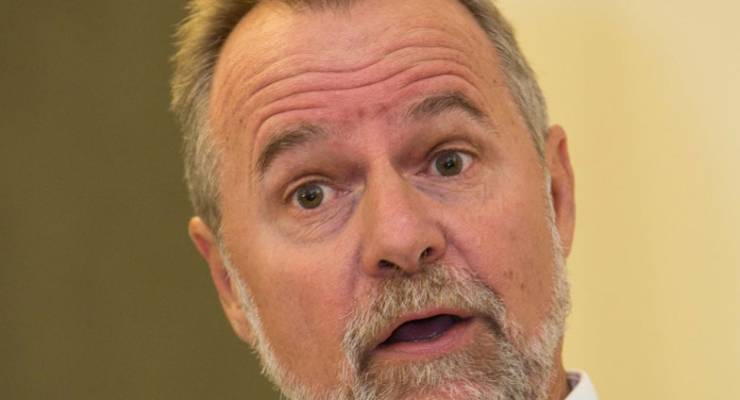
Briefs are not briefings, according to Indigenous Affairs Minister Nigel Scullion, who has admitted that he was given more detail about abuse in the Don Dale juvenile justice centre than he previously let on.
In July, Four Corners aired disturbing footage of the use of tear gas on six boys held in the Behavioural Management Unit of the Don Dale Youth Detention centre outside of Darwin in August 2014, as well as the use of so-called spit hood head coverings and mechanical restraint chairs. The TV report followed two written reports into the matter, including most recently by the NT Children’s Commissioner in October last year.
Scullion faced dozens of questions from Labor over the course of two hours in Senate estimates on Friday about his knowledge of the Don Dale issue before the Four Corners report, after Crikey revealed in September Scullion had been given five briefs on the matter before the episode went to air. He had claimed, before the Crikey article, that the issue had only come up once.
The documents obtained under freedom of information revealed that the department prepared four question time briefings for Scullion to use should the matter be brought up:
- October 12, 2015
- November 5, 2015 (not a sitting date but the date it was prepared)
- March 2, 2016
- March 3, 2016
Scullion sought to downplay the briefs, claiming that it was a single question time brief and a meeting brief, and he argued that the briefs were not formal briefings on the matter.
“A brief is significantly different from a briefing. A briefing is what people would say … someone comes and visits you and provides a briefing. This isn’t about semantics because it is about what I said,” he said.
“In my response in the media interviews that followed … I said to my knowledge I said I didn’t receive a brief on it, and that was what I was referring to.”
Labor Senator Jenny McAllister said she didn’t accept a “semantic narrowing down of the kind of information that constitutes a brief” and Scullion replied that there were “considerable differences” between a brief for a meeting, a question time brief and a briefing.
[Scullion briefed multiple times on Don Dale, puts lie to ‘didn’t know’ claim]
“I had no briefings which would lead me to suspect that those matters we’d seen on [Four Corners] were occurring,” he said.
Scullion admitted he only read the NT Children’s Commissioner report on the matter after the Four Corners episode, but he defended his inaction because he said the reports at the time didn’t contain the footage or evidence of a “culture of brutality”.
“That was a difference. I don’t think you would have had a royal commission,” he said. “[The NT Children’s Commissioner report] was graphically different to the matters that were contained in the reports. [It was] nowhere near as graphic as the Four Corners report. It only had two still photos, neither of which included human beings.”
McAllister then quoted from the report, in which the former NT corrections minister is alleged to have said: “Mate, I don’t mind how much chemical you use, we gotta get him out.”
“That information was in the public domain. It may be in writing other than pictures … but that’s still pretty graphic,” McAllister said.
“What I said is it wasn’t evident from the reports that there was a culture of brutality and a culture of cover-ups,” Scullion replied.
In the time since the Four Corners report and the subsequent royal commission announcement, Scullion said he had committed to doing more to raise indigenous incarceration issues with his state and territory counterparts, and he had consulted the relevant state and territory ministers on every incident over the past few months. He said the department was still checking his records on what he knew and when.
Scullion indicated the government was developing a “package of actions” to improve indigenous incarceration levels, and it would be brought before the next Council of Australian Governments meeting. Labor Senator Pat Dodson said the government should go back and read the 339 recommendations made in the Royal Commission into Aboriginal Deaths in Custody report as part of any action plan.
“You can’t pretend you have amnesia. There was a culture here that was inquired into after a lot of pain in the indigenous community … and we’re now back at the inquiry into Don Dale and I have no doubt this is going to spread beyond Don Dale.”








Scullion crawls across as just a lazy git who wants all the glory of office, without the work.
That could be said of at least half of Cabinet.
Why on earth did Malcolm appoint him? Hasn’t European Australia faced enough shame concerning Aboriginal Australia without having an incompetent as Minister? I recall that he went out to dinner on the night of the Four Corners program rather than watch it which shows his disdain for his portfolio. Get rid of him, Malcolm.
Another one misleading parliament without suffering any consequences.
OH! You are suggesting that members of the Cabinet (or their personal officers) need to READ? Goodness, gracious me! How rude! How inexplicable! What, exactly are staff expected to do if not read the documents and provide well constructed 1 or 2 page info sheets with some dot points and possible actions (say, 3) for the BUSY pollie?